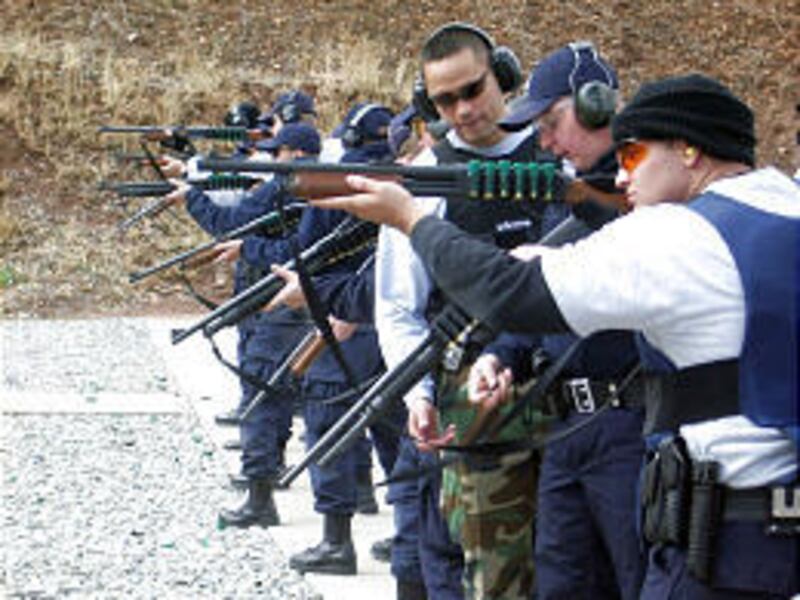Salt Lake City police expected there would be several advantages to hosting their own police academy.
What the department wasn't expecting were the number of familiar names in the academy's first class.
In a graduating class of about 20, six of the cadets were sons of current Salt Lake City police officers, including one of the assistant chiefs, and one was the son of a judge.
"It reflects greatly on the department that the sons of officers would think highly enough of their fathers' profession that they'd follow them into the field," said Salt Lake City Police Chief Chris Burbank.
Salt Lake City Police recently received certification to host its own police academy, similar to the Peace Officers Standard and Training (POST) Academy traditionally held near 4500 South and 2700 West. POST will soon move its operations to the new Larry H. and Gail Miller Public Safety Training Center on Salt Lake Community College's Miller Campus, 9750 S. 300 West.
Salt Lake is one of the few agencies in the state that hire officers first, then pay for them to receive their Category One police officer state certification at POST. After their POST training, Salt Lake City cadets then had to go through several more weeks of training geared specifically toward Salt Lake City's policies and procedures. The new setup saves cadets three months of additional training.
The Salt Lake Academy's 17-week course was such a success that the department was granted satellite POST academy status. Furthermore, the cadets from the Salt Lake Academy finished with some highest test scores in recent memory.
"The Salt Lake Academy is very academic driven. They have to maintain a specific average to stay in the academy. It puts a lot of pressure on them to perform," said officer Jared Wihongi, the head instructor for the first academy. "They were very high-caliber guys who could have gone into anything."
Some of those cadets came from a law enforcement family and considered a different career path before finally choosing to be an officer.
"It speaks a lot of their parents to represent their profession in a way kids would want to follow," Wihongi said.
Jeremy Sayes and Scott Stuck both became interested in police work after doing ride-alongs with their fathers as kids.
Stuck actually went to college, got a degree in sociology and planned to work with children before switching to law enforcement.
"I wanted to help people. Turns out (police work was) what I preferred doing," he said. "I'm helping more people than just working with kids."
Merrill Stuck has been an officer for 28 years, all but 1 1/2 years of that with Salt Lake City. His own father spent 22 years in law enforcement before retiring as a sergeant in 1985 with the Salt Lake City Police Department. Now, Scott Stuck is the latest to follow in the family footsteps.
"My dad didn't really say either way (about whether to become an officer). As soon as I decided though, he jumped on the bandwagon and was pushing for it, everywhere he could," Stuck said.
Like Stuck, Jeremy Sayes became interested in law enforcement after riding with his father a few times and seeing what he did firsthand.
"I love the excitement of it. I love helping people," he said. "I hate to see people hurt by other people."
The first time he brought up the idea of becoming an officer, Jeremy Sayes, who also thought about becoming a Navy SEAL, said his father told him to hold off for a little bit to see if anything else came up.
Morgan Sayes is a self-described Army brat whose own father served in Vietnam and then discouraged his other children from going into the military. After his son decided for sure that law enforcement was what he wanted to do, Morgan Sayes said he was proud but also had a few reservations like any protective father would.
"It's an honor he thinks that highly of, one, me and two, the profession that I'm in," Morgan Sayes said. "People who get into law enforcement tend to get a hard edge to their personality. My son is a good man. I don't want him to get that edge.
"(Police work) is a lot more dangerous than it was 24 years ago. I don't want him to become unhappy, bitter or cynical. People in law enforcement see the worst in society. You see people who hurt each other. You see what happens when people get into drugs," Morgan Sayes said.
Morgan Sayes hopes his son will continue to be a church-going man, continue to stay grounded throughout his career, continue to have common sense and resist the trap that some officers do of believing the only people who can relate to them are other officers.
Both Jeremy Sayes and Scott Stuck said they're excited to work with their graduating class and watch each other progress in their law enforcement careers. And along the way, they're hopeful for the day they might get to work not only side-by-side with their own fathers but with other veteran officers whom they've known since childhood.
"The weirdest thing is when I rode with a guy who was my dad's partner forever. It was odd to be in that position, but it was neat," Sayes said.
Stuck recalled one day during the academy that another one of the cadets' fathers, who is also an officer, showed up to participate in training.
"His dad made us go running with him one day and made us do push-ups for choosing to be cops instead of something that made money," he said with a laugh. "Everyone feels the same way. They want to help people. This is the way to do it."
E-mail: preavy@desnews.com


